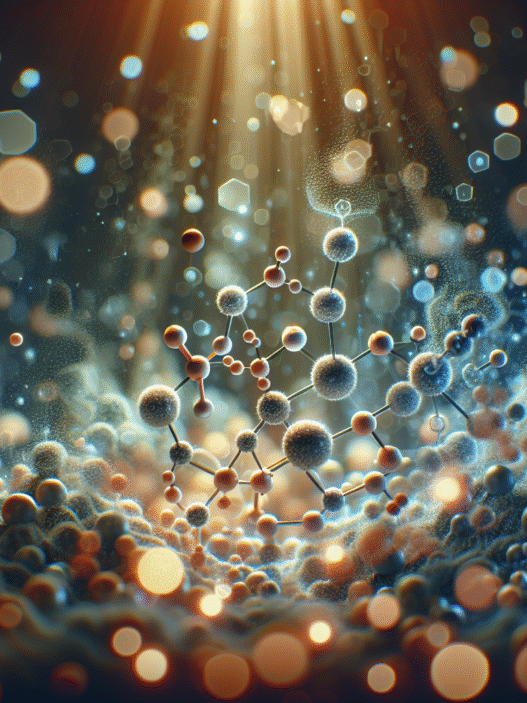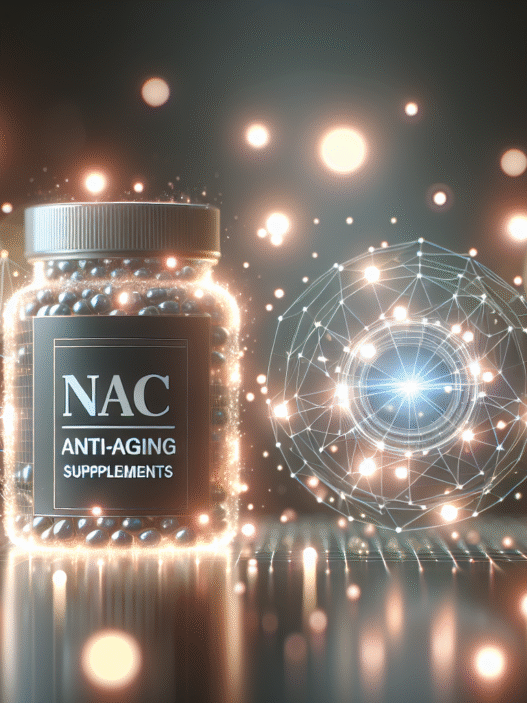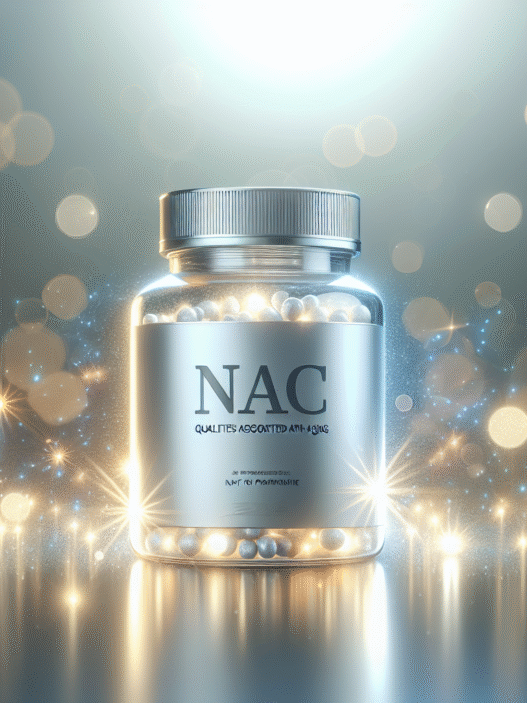Understanding N-Acetyl Cysteine (NAC)
Introduction to NAC
N-Acetyl Cysteine (NAC) emerges as a powerful compound known for its various health benefits that are particularly significant for those concerned about liver health, detoxification, and longevity. NAC is a derivative of the amino acid cysteine and plays a crucial role in replenishing glutathione levels in the body, a vital antioxidant that protects against cellular damage. Due to its wide range of uses, NAC has garnered interest for its potential in improving overall health and longevity.
NAC has a long history of safe use and is currently being considered by the FDA for inclusion in supplements, reflecting its growing popularity as a health-promoting agent. It is well-regarded for preventing complications like contrast-induced nephropathy during various medical procedures.
Mechanisms of Action
The effectiveness of NAC stems from its multifaceted mechanisms of action. Primarily, it functions as an antioxidant and anti-inflammatory agent, which is crucial for combating diseases related to oxidative stress and inflammation. NAC enhances intracellular glutathione levels, which is essential for detoxification and cellular protection (PMC).
Additionally, NAC regulates the neurotransmitter glutamate, contributing to the neuronal health and maintaining a balanced brain environment. Its detoxifying properties also make it beneficial to the liver, where it aids in neutralizing harmful toxins.
NAC’s applications further extend to reducing the risk of heart disease by preventing oxidative damage to heart tissues. This is particularly relevant for individuals with conditions such as diabetes or those recovering from specific heart surgeries, presenting it as a viable treatment option to protect heart function (Healthline).
The diverse functionalities of NAC continue to position it as a crucial supplement for individuals seeking enhanced health and longevity, especially in populations at risk for oxidative stress and inflammation-related diseases. For more insights into the benefits of NAC, refer to our article on n-acetyl cysteine benefits.
Benefits of NAC for Longevity
N-Acetyl Cysteine (NAC) is gaining attention for its potential contributions to longevity and overall health. Its diverse mechanisms can significantly impact liver and kidney function, brain health, and respiratory wellness.
Liver and Kidney Support
NAC is known to support liver and kidney health by potentially enhancing detoxification processes. It may speed up the breakdown of drugs and other toxins within the body. This is particularly vital for individuals concerned about liver health and effective detoxification (WebMD). Research shows that NAC can stimulate the conversion of acetaminophen into less harmful compounds, making it a critical option during overdose situations.
| Effect | Description |
|---|---|
| Detoxification | Accelerates breakdown of toxins in the liver and kidneys. |
| Drug Metabolism | Aids in metabolizing medications, helping reduce toxic buildup. |
Table: NAC’s Role in Detoxification
| Organ | Function |
|---|---|
| Liver | Breaks down drugs, helps detoxify. |
| Kidney | Filters waste products, supports excretion. |
Brain Health Enhancement
NAC plays a significant role in brain health by replenishing glutathione levels and regulating neurotransmitters like glutamate. These mechanisms are essential for cognitive function and may help protect against neurodegeneration. Enhanced glutathione levels can reduce oxidative stress, contributing to improved brain health and potentially lowering the risks of conditions that affect longevity.
| Mechanism | Benefit |
|---|---|
| Glutathione Production | Protects against oxidative damage. |
| Neurotransmitter Regulation | Supports mood and cognitive function. |
Respiratory Health Improvement
NAC is also beneficial for respiratory health, as it helps break up mucus and reduce inflammation, particularly in conditions like cystic fibrosis. High doses of NAC (around 1,200 mg per day) can significantly improve airway health, making it easier to breathe by alleviating oxidative stress in lung tissues.
| Benefit | Description |
|---|---|
| Mucus Reduction | Aids in breaking up biofilms in the lungs. |
| Inflammation | Helps lessen inflammation in the airways. |
By understanding the multifaceted benefits of NAC, individuals focused on longevity can make informed choices regarding their health and wellness strategies. Exploring the potential of NAC supplements for longevity can lead to a healthier and more vibrant life. To learn more about the various benefits of NAC, visit our page on n-acetyl cysteine benefits.
NAC in Disease Management
N-Acetyl Cysteine (NAC) is garnering attention for its potential role in disease management, particularly concerning obesity, heart disease, and immune function. This section explores how NAC could contribute to overall health and longevity.
Obesity and Metabolism
NAC may help manage obesity by influencing critical processes such as fat storage, energy metabolism, and hormone balance. While more research is necessary to determine its efficacy in this area, early studies suggest that NAC could play a role in controlling weight and improving metabolic health WebMD.
| Process | Potential Effect of NAC |
|---|---|
| Fat Storage | May assist in regulating fat storage |
| Energy Metabolism | Could enhance energy metabolism |
| Hormone Balance | Might contribute to hormonal regulation |
Heart Disease Risk Reduction
The antioxidant properties of NAC are believed to reduce the risk of heart disease by preventing oxidative damage to heart tissues. This protective effect may lead to improved heart function and health, particularly in individuals with diabetes or those recovering from certain heart surgeries. NAC’s ability to boost glutathione levels strengthens its role in supporting cardiovascular health Healthline.
| Health Benefit | Description |
|---|---|
| Prevents Oxidative Damage | Protects heart tissues from cell damage |
| Supports Heart Function | May aid in heart recovery post-surgery |
| Reduces Risk Factors | Could lower risk factors associated with heart disease |
Immune Function Enhancement
NAC has been shown to enhance immune function by boosting glutathione levels, a potent antioxidant that helps remove free radicals that can damage cells. This ability to restore immune function is particularly significant for individuals with diseases linked to NAC and glutathione deficiency Healthline. NAC may also help improve insulin resistance, especially in conditions like polycystic ovary syndrome (PCOS) WebMD.
| Immune Function | Potential Advantage of NAC |
|---|---|
| Glutathione Boost | Increases the body’s antioxidant defenses |
| Restores Immune Function | Beneficial for individuals with certain deficiencies |
| Improves Insulin Resistance | May assist those dealing with PCOS-related insulin issues |
By understanding the potential benefits of NAC in disease management, individuals concerned about their health can consider its role in enhancing longevity. For more information on NAC’s other benefits, check out our article on n-acetyl cysteine benefits.
Research on NAC Effectiveness
Fertility Support
N-Acetyl Cysteine (NAC) has demonstrated potential benefits in supporting fertility. For men, NAC may help reduce oxidative stress that can damage or kill reproductive cells. Women with conditions like polycystic ovary syndrome (PCOS) find NAC particularly beneficial as it can help induce or enhance the ovulation cycle. This dual action of NAC highlights its role in fertility enhancement for both genders.
Antioxidant Properties
NAC is widely recognized for its strong antioxidant properties. It helps in boosting glutathione levels, a potent antioxidant that aids the body in combating oxidative stress. By doing so, NAC may also contribute to reducing the risk of various health conditions such as heart disease and diabetes. Below is a summary of its antioxidant effectiveness:
| Function | Effect |
|---|---|
| Boosts Glutathione | Increases body’s antioxidant levels |
| Reduces Oxidative Stress | Protects cells from damage |
| Long-term Health Benefits | May lower risks of chronic diseases |
For more information on NAC’s potent antioxidant effects, visit our page on nac antioxidant properties.
Immune System Function
NAC has been shown to enhance immune function. Its ability to increase glutathione levels may restore immune function in individuals with deficiencies related to NAC and glutathione. Additionally, NAC assists the body in creating more glutathione, which may lead to better immune responses.
| Immune Function Effect | Description |
|---|---|
| Enhances Immune Response | Boosts natural defenses |
| Restores Function | Aids those with deficiencies |
| Reduces Inflammation | Helps manage inflammatory responses |
For further details on how NAC can benefit overall health, explore our article on n-acetyl cysteine benefits.
NAC as a Supplement
FDA Consideration
N-Acetyl Cysteine (NAC) has a long history of safe use, and the FDA is currently evaluating its status for use in dietary supplements. In 2022, the FDA released guidance concerning the use of NAC in supplements, which identifies its potential benefits while ensuring safety standards are adhered to. This could lead to more explicit regulations and recommendations regarding its consumption as an aid for health and longevity.
Dosage and Administration
For those considering NAC supplementation for its various benefits, understanding proper dosage is essential. While standard dosages may vary based on individual needs and health goals, a common recommendation involves:
| Purpose | Suggested Dosage |
|---|---|
| General wellness | 600-1,800 mg daily |
| Liver health support | 600-1,200 mg daily |
| Antioxidant effect | 600-1,800 mg daily |
| Fertility enhancement | 600-1,200 mg daily |
Dosages should be adjusted based on individual health conditions and recommendations from healthcare professionals. A consultation with a healthcare provider is advisable for personalizing dosage and ensuring safe intake, particularly in special health situations or potential interactions with other medications.
For more information on specific dosing guidelines, see our article on n-acetyl cysteine dosage.
Safety and Side Effects
NAC is generally considered safe for most individuals when taken as directed. However, it may cause some side effects in certain people. Commonly reported side effects include:
- Gastrointestinal upset
- Nausea
- Diarrhea
- Stomach pain
In rare cases, allergic reactions can occur, which may present as rash, itching, or difficulty breathing. Individuals with existing medical conditions or those taking specific medications should consult a healthcare professional before starting NAC supplementation.
NAC’s potential in relieving health issues extends beyond basic supplementation, as it has also shown beneficial effects against oxidative damage and may support various bodily functions. For those interested in the skin benefits of NAC, including its role in anti-aging, see our resources on n-acetyl cysteine for skin and nac for anti-aging.





















